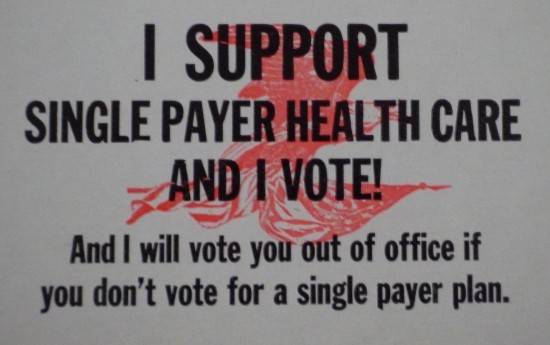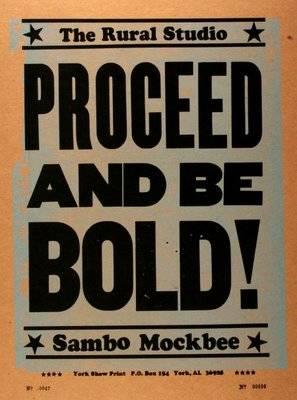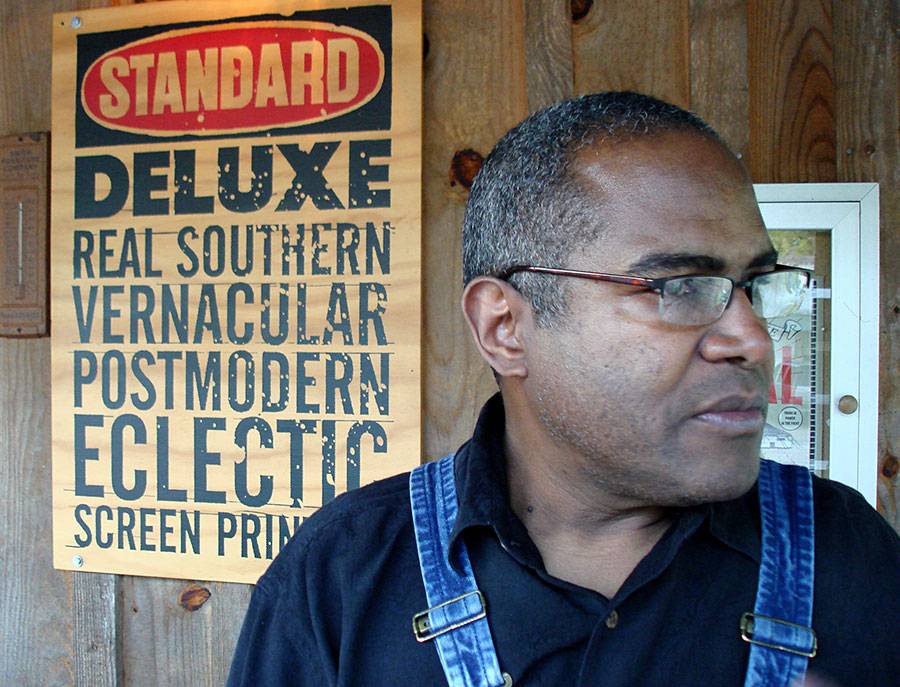Armed with a printing press, Alabama artist Amos Paul Kennedy Jr prints words and symbols on paper both for profit and for personal expression. His posters roll language and color into a visually engaging four-cornered (and sometimes four-lettered) package, and have made their way all over the country in the twenty-some years he’s been printing.

Mr. Kennedy Jr. is in town as part of the University of Illinois Artist Residency program, and will be showcasing some of his work at the UIUC Main Library, as well as the Indi Go Gallary in Downtown Champaign from Feb 28 – March 3. Additionally he’ll be selling his work during a closing reception at Indi Go on March 3rd from 6-9PM, as well as producing a book with the Soybean Press, giving talks around town, etc. Basically this gentleman in denim coveralls is taking the town by storm. This week I contacted him to conduct an interview, and was richly rewarded with responses fit for block-print.
Smile Politely: How important do you consider your own personal, professional, or cultural experience to enjoying and understanding the art?
Amos Paul Kennedy Jr.: One understands ART because one is human.

Smile Politely: Printmaking can be described as as series of mechanically assisted tasks that all have a clear beginning, middle, and end. With this in mind, when do you determine that a piece is ‘done’?
Amos Paul Kennedy Jr.: When it says ” STOP”.
Smile Politely: Language has a huge stake in the final product that you create. When you assemble your non-commissioned work (your own work), do you write before you start the printing process, or develop things as you go? On that note; how much of what you do is a reaction to what’s happening on the paper, or do you feel you completely ‘own’ the process?
Amos Paul Kennedy Jr.: I collect sayings related to the topic I will print posters about,. Then select the quotes/proverbs/sayings/etc I will use. Everything is done at the press by the pres/paper/ink/me. If I plan it, I will not build it.
Smile Politely: Do you feel limited by the scale available with use in the printing press? Would you consider working much larger if the machinery was available?
AK: Limitations spark creativity. I have larger presses. But I have not learn to operate them.
Smile Politely: As a UIUC graduate [he’s not — m.c.], the show at IndiGO in Champaign represents a returning to past-familiar territory. Did this effect the work you selected for the show? Why or why not (should we look for any special messages you have for the community?).
Amos Paul Kennedy Jr.: I graduated from Grambling College in Grambling, LA. Then earned an mfa from the University of Wisconsin,Madison. I have visited UIUC 4 times in the past.
Smile Politely: A great deal of the words you print are directed at the viewing public in the form of advice, lessons or even admonishment. Do you feel any moral obligation to live by what you print?
Amos Paul Kennedy Jr.: NO!

Smile Politely: (this one’s more of a personal curiosity) The graphical silhouette used in your ‘Put the Message in the Hands of the People and Move On’ talk strongly invokes the works of Aaron Douglas. Having seen a great deal of his work in Nashville, I was immensely impressed with his use of color and scale. Do you consider Aaron Douglas to have any impact on your own work, and have you considered moving towards more graphical as opposed to text-based work?
Amos Paul Kennedy Jr.: I stole the image from Douglas but it is modified. I love Douglas’ use of color. I will continue to explore text as image.
Smile Politely: By the very nature of the medium you’re operating in, you’re creating an incredible amount of physical work, as well as literary content. What would you like the eventual fate of your artwork to be, and does that deviate from what you think the eventual fate of you artwork will be (in 20, 50, or 100 years)?
Amos Paul Kennedy Jr.: Since my work is purchased by the citizens of theseunitedstatesofamerica, I have no idea of the fate of the work.
Smile Politely: And finally, what’s your least favorite question you get asked about your work?
Amos Paul Kennedy Jr.: I don’t have a least favorite question.
The preceding interview was conducted on February 23rd, 2010 via electronic mail
Michael Curtin is a practicing artist from Champaign, IL. Click here for more information on him and his work.








